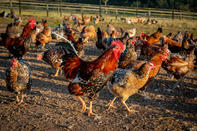Diseases are one of the biggest threats to poultry production, resulting in large-scale income losses on farms across the world. While medicine may be used to cure some of these diseases, there are many diseases for which no treatment exists.

To worsen matters, most of these diseases tend to spread like wildfire because poultry birds are generally kept in close proximity to each other and share drinking and feeding buckets.
The best way to manage diseases in poultry production is therefore to prevent them from breaking out in the first place. There are four ways in which disease may be prevented, namely through sound biosecurity measures, vaccination, good hygiene and stress management.
Curative Measures
Producers need to act fast at the first signs of disease to prevent it from spreading to other birds or in some cases to other animals and even humans.
The National Department of Agriculture advises farmers to separate sick birds from healthy ones and to handle the sick birds last during production tasks. An animal health technician or veterinarian should be consulted as soon as possible to identify the correct course of action.
The animal health technician or veterinarian will perform autopsies on some of the sick birds and might take blood or eggs samples, to determine the cause of an outbreak.
To prevent future outbreaks, the farmer and animal health technician or veterinarian should go through the entire production system to identify possible problems that can be corrected to prevent future outbreaks. Treatment will depend on the cause of the disease, ranging from medicine such as antibiotics to the culling of birds.
While some producers might have used antibiotics to cover up poor management practices in the past, rising concern over the development of antibiotic resistance has led to more responsible use of these products.
In some countries, producers are no longer able to buy antibiotics without a prescription from a veterinarian. When using any medication, producers should store and apply the products according to the instructions. Using medication according to instructions, not only ensures that the treatment will work but also helps to prevent the development of resistance.
Farmers should also keep the withholding period of these medicines in mind – in other words the time before eggs or meat from treated birds may be sold after birds have received medication – to ensure their produce complies to South African minimum residue legislation.
By Glenneis Kriel